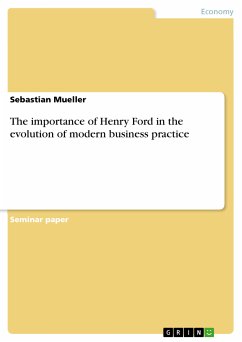
The importance of Henry Ford in the evolution of modern business practice (eBook, ePUB)

PAYBACK Punkte
0 °P sammeln!
Seminar paper from the year 2006 in the subject Business economics - Industrial Management, grade: 1,3, University of Limerick, course: Business and Society, language: English, abstract: Henry Ford is routinely lauded as "the creator of mass production and (...) the production line", being responsible for the "wonders of the industrial world and the first great management wonder of the twentieth century" (Crainer 2000, p.21). Fordism, deriving from the concept of Scientific Management by Frederick Winslow Taylor describes a form of economic process based on the idea of a production line with a...
Seminar paper from the year 2006 in the subject Business economics - Industrial Management, grade: 1,3, University of Limerick, course: Business and Society, language: English, abstract: Henry Ford is routinely lauded as "the creator of mass production and (...) the production line", being responsible for the "wonders of the industrial world and the first great management wonder of the twentieth century" (Crainer 2000, p.21). Fordism, deriving from the concept of Scientific Management by Frederick Winslow Taylor describes a form of economic process based on the idea of a production line with a complex division of labour (Crainer 2000, p.24; Taylor, 1911). However, Henry Ford was not the first person to produce with an assembly line. Already half a century before him, the assembly line method was introduced in a slaughterhouse in Cincinnati. Likewise, Henry Ford was not the first person to consider the creation and service of a mass market by using market-driven standardized products, special purpose equipment and a sophisticated wage system (Crainer 2000, pp.21-26). Henry Ford was, however, the first to synchronize these concepts and utilize them to introduce innovations in product, process and organization, making Fordism a revolutionary concept for the twentieth century (Shimokawa et al. 1997, p.20; Bankston 2004, p.9). Now as we begin the twenty-first century, it becomes clear that business practice has been significantly changed, putting great emphasis on concepts such as supply chain management and the automation of production processes through computer aided concepts such as computer aided design (CAD) and manufacturing (CAM). This essay, by focusing on major concepts of present business practice, will critically analyse the importance of Henry Ford for this evolution. In order to establish an all-inclusive evaluation, it is necessary to analyse the main principles and innovations of Fordism separately and determine the implications each has for modern business practice.
Dieser Download kann aus rechtlichen Gründen nur mit Rechnungsadresse in A, B, BG, CY, CZ, D, DK, EW, E, FIN, F, GR, HR, H, IRL, I, LT, L, LR, M, NL, PL, P, R, S, SLO, SK ausgeliefert werden.













